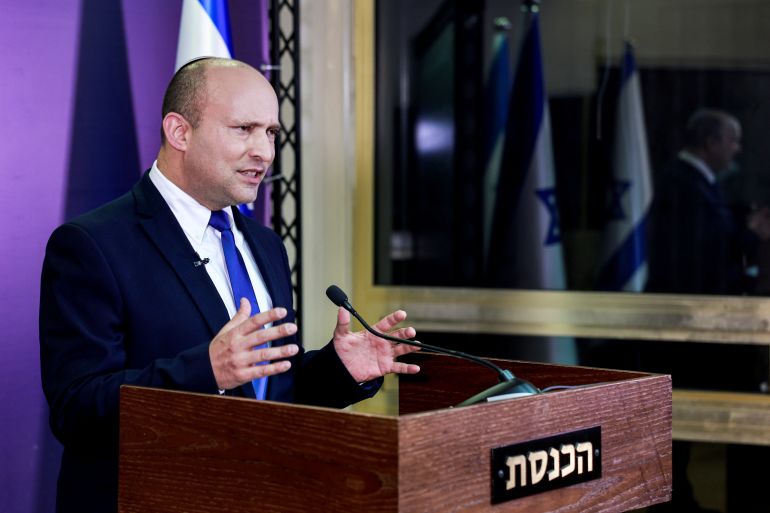US official meets with Israeli PM on Iran nuclear deal talks
Jake Sullivan called for a ‘common strategy’ as world powers continue to negotiate new nuclear deal.

United States National Security Adviser Jake Sullivan met Israeli Prime Minister Naftali Bennett, calling for a “common strategy” as world powers continue to negotiate a new nuclear agreement with Iran.
Bennett meanwhile warned during the Wednesday meetings that negotiations in Vienna on Iran’s nuclear programme had “profound ramifications” for Israeli security.
Keep reading
list of 3 itemsIran nuclear deal faces challenging path, experts say
US envoy visiting Middle East allies ahead of Iran nuclear talks
Bennett’s government has remained firmly opposed to continuing international efforts to revive the 2015 accord that saw Iran agree to curbs on its nuclear activities in exchange for sanctions relief.
Former US President Donald Trump withdrew from the agreement in 2018, and instead began a campaign of “maximum pressure” sanctions against Tehran, who in turn flouted commitments under the deal.
Sullivan said on Wednesday his visit to Israel had come at “a critical juncture”.
“It’s important that we sit together and develop a common strategy, a common outlook, and find a way forward that fundamentally secures your country’s interests and mine,” Sullivan said, according to an Israeli government statement.
He did not directly mention Iran but the Israeli statement said the meeting focused on the Vienna talks, which are expected to soon enter their eighth round.
Bennett has called for the negotiations to be halted, accusing Iran of “nuclear blackmail” and charging that revenue it gained from sanctions relief would be used to acquire weapons to harm Israelis.
“What happens in Vienna has profound ramifications for the stability of the Middle East and the security of Israel for the upcoming years,” Bennett told Sullivan, according to his office.
Sullivan also met with his Israeli counterpart Eyal Hulata as part of the US-Israel Strategic Consultative Group on Wednesday.
“The delegations discussed the need to confront all aspects of the threat posed by Iran, including its nuclear program, destabilizing activities in the region, and support for terrorist proxy groups,” the White House said in a statement describing the meeting.
“They agreed that Iran’s rapidly advancing nuclear program poses a grave threat to the region and to international peace and security.”
The statement added that Sullivan updated the Israeli delegation on the progress of the Vienna talks, stressing that the US and Israel are “aligned in their determination” that Iran should never get a nuclear weapon.
Sullivan later told reporters that diplomatic efforts to revive the nuclear deal could be exhausted in “weeks.”
“We’re not circling a date on the calendar in public, but I can tell you that behind closed doors we are talking about time frames and they are not long,” he told reporters.
Lead US Iran negotiator Rob Malley also told CNN on Tuesday that there are only “some weeks” left to revive the deal if Tehran continues its nuclear activities at the current pace.
“It really depends on the pace of their nuclear process,” said Malley, the US special envoy for Iran. “If they halt the nuclear advances, we have more time.
“If they continue at their current pace, we have some weeks left but not much more than that, at which point the conclusion will be there’s no deal to be revived,” he said.
Iran says it only wants to develop a civil nuclear programme.
Sullivan also met with Palestinian President Mahmoud Abbas in Ramallah in the occupied West Bank during the trip. “Mr. Sullivan reaffirmed President Biden’s commitment to achieving a two-state solution and discussed the importance of actions to build trust, enhance stability and security, and foster a more hopeful vision for the future,” National Security Council spokesperson Emily Horne said in a statement on the meeting.